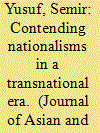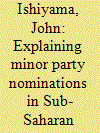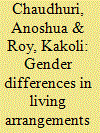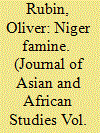| Srl | Item |
| 1 |
ID:
089759


|
|
|
|
|
| Publication |
2009.
|
| Summary/Abstract |
Embarking on an outlook pertinent to the state of social fields in a global era, this article demonstrates the validity of the insight that rejects any strict bifurcation between localizing and globalizing tendencies in the maintenance of social life-worlds. By employing an appropriate term for the `transgressive' nature of nationalistic imaginations and actions, `transnationalism', it delves into qualitatively, but briefly analyzing the current status and futurity of, and the nature of the relationship that exists between, Ethiopianist and Oromo (a specific brand) nationalisms. The result is that neither of the two nationalisms seems to vanish amid the `network society' of the new global era, nor, by implication, is the contention between them likely to recede (until and unless they undergo significant, internal qualitative transformations).
|
|
|
|
|
|
|
|
|
|
|
|
|
|
|
|
| 2 |
ID:
089760


|
|
|
|
|
| Publication |
2009.
|
| Summary/Abstract |
To what extent do parties in Africa behave in ways similar to parties in new democracies elsewhere in the world? I examine nominations by the `minor' opposition parties to the single member districts for the legislative elections in Ethiopia, Malawi and Zambia. Using binary logit analysis, I found that generally the number of candidates running in a contest and the use of an `electoral arithmetic' by the parties explains whether they chose to nominate a candidate in a particular electoral district. However, the social demographic characteristics of districts appear to have little impact on whether or not a party nominates a candidate.
|
|
|
|
|
|
|
|
|
|
|
|
|
|
|
|
| 3 |
ID:
089757


|
|
|
|
|
| Publication |
2009.
|
| Summary/Abstract |
This article uses the 52nd round of National Sample Survey data to examine gender differences in living arrangement choices of the elderly in India. Older women are more likely to live alone than older men, even after controlling for demographics, socioeconomic characteristics, health status, economic independence and property ownership. Economic independence is associated with higher likelihood of living alone for men and women. While physical immobility decreases the likelihood of living with children or extended family for older men, older and physically immobile women are less likely to live alone if they have sons rather than daughters.
|
|
|
|
|
|
|
|
|
|
|
|
|
|
|
|
| 4 |
ID:
089758


|
|
|
|
|
| Publication |
2009.
|
| Summary/Abstract |
By applying a widely accepted method for famine operationalization, the 2005 food crisis in Niger is categorized as a famine. This presents a unique opportunity to assess Amartya Sen's two most important famine contributions: (1) the entitlement framework for famine analysis; and (2) the hypothesis of a positive effect of democracy on famine protection. The fact that the Niger famine was caused by unfavorable terms of trade rather than a collapse in food production supports the focus of the entitlement framework on access to food; nevertheless, the belated and inadequate response to the crisis from the democratically elected Nigerien government appears to undermine the link between a pluralistic political system and effective famine protection.
|
|
|
|
|
|
|
|
|
|
|
|
|
|
|
|